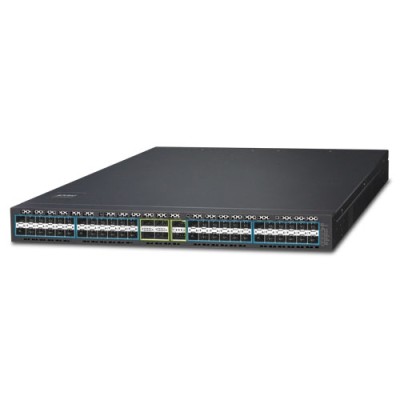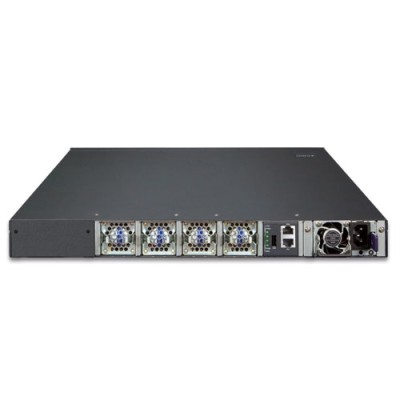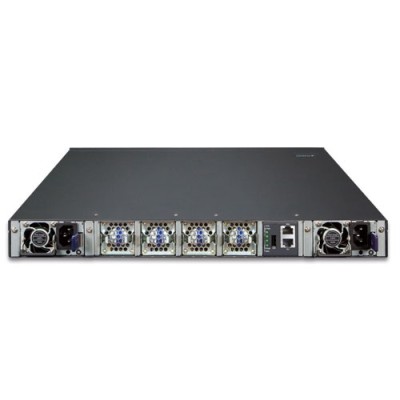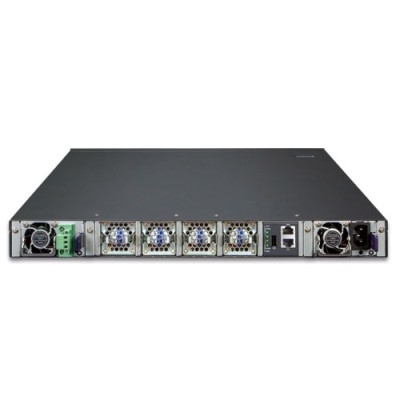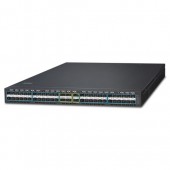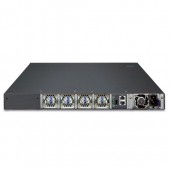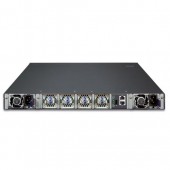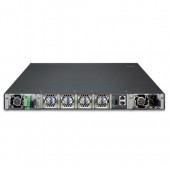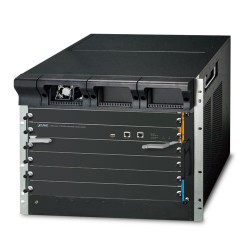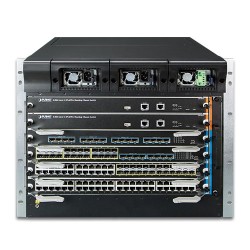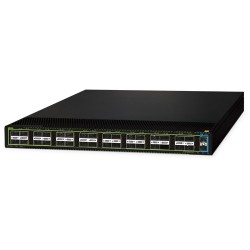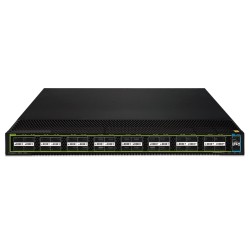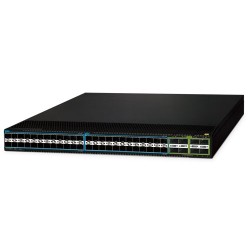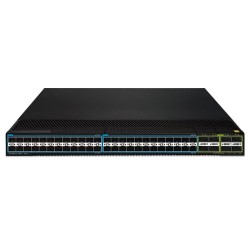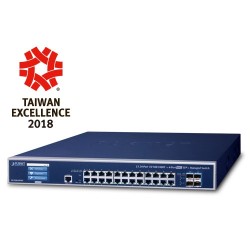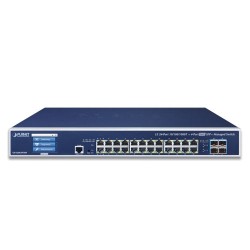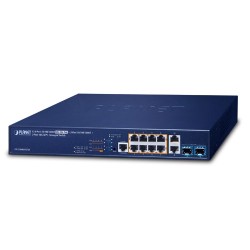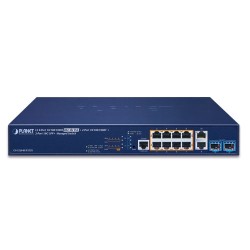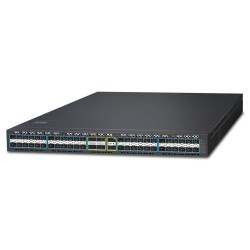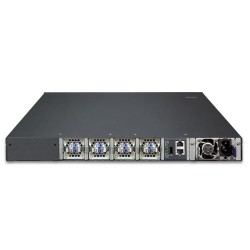- Stock: In Stock
- Brand: PLANET
- Model: XGS-6350-48X2Q4C
- Weight: 10.63kg
- Dimensions: 40.40cm x 44.20cm x 4.40cm
Powerful 100Gbps Solution for All Long-Reach Networks
PLANET XGS-6350-48X2Q4C is a High-performance Layer 3 Managed Switch that meets the next-generation Metro, Data Center, Campus and Enterprise network requirements. It has high-density 48 10G SFP+, 2 40G QSFP+ and 4 40G/100GbE QSFP28 fiber interfaces delivered in a 1RU rugged case.

The administrator can flexibly choose the suitable transceivers according to the transmission distance or the transmission speed required to extend the 1G/10G/40G/100G network efficiently. Besides, with 1.92Tbps switching capacity, the XGS-6350-48X2Q4C can handle extremely large amounts of data in a secure topology linking to backbone or high capacity servers where audio, video streaming and multicast applications are utilized.
Extractive Power Supply Design to Increase Flexibilty
The XGS-6350-48X2Q4C is equipped with one extractive 100~240V AC power supply unit, so it is easy to replace the power for users. Besides, the XGS-6350-48X2Q4C reserves another backup power slot on the rear panel where the second AC or DC power can be added to make it a redundant power supply. The redundant power system is specifically designed to handle the demands of high-tech facilities requiring the highest power integrity.
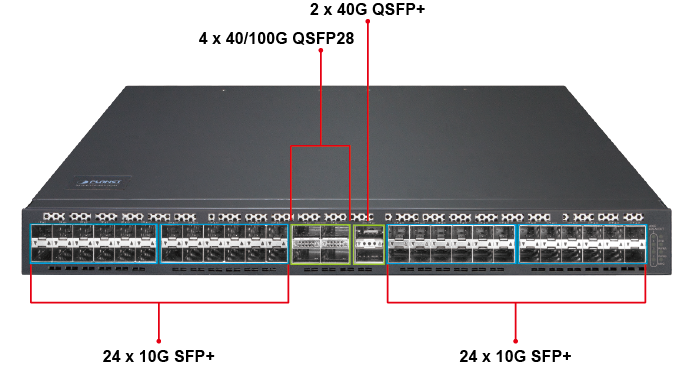
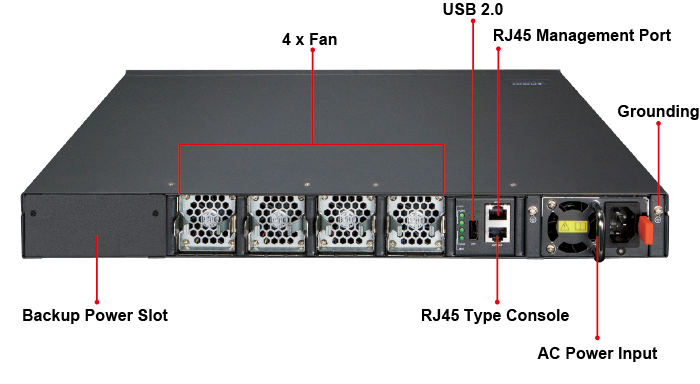
Rich Multi-layer Networking Protocols
The XGS-6350-48X2Q4C comes with the complete Layer 3 managed function with comprehensive protocols and applications to facilitate the rapid service deployment and management for both the traditional L2 and L3 networks. With support for advanced features, including RIP, RIPng, OSPFv2, OSPFv3, BGP, BGP4+, etc., this switch is ideal for the traditional or fully-virtualized data center.
Strong Multicast
The XGS-6350-48X2Q4C supports abundant multicast features. In Layer 2, it features IPv4 IGMPv1/v2/v3 snooping and IPv6 MLD v1/v2 snooping. With Multicast VLAN Registration (MVR), multicast receiver/sender control and illegal multicast source detection functions can be had. In Layer 3 multicast protocols, it features PIM-DM, PIM-SM and PIM-SSM which make the XGS-6350-48X2Q4C great for any robust networking.
Full IPv6 Support
The XGS-6350-48X2Q4C supports IPv4-to-IPv6 technologies including IPv4 manual/automatic tunnel, IPv6-to-IPv4 tunnel, and Intra-Site Automatic Tunnel Addressing Protocol (ISATAP) tunnel. It comprehensively supports IPv6 Neighbor Discovery, DHCPv6, Path MTU Discovery, IPv6-based Telnet, SSH and ACL, meeting the need of IPv6 network device management and service control.
High Reliability
The key components of the XGS-6350-48X2Q4C are management module, power system and the fan system with redundancy design. All system modules support hot-swap and seamless switching without manual intervention.
It supports In-service Software Upgrade (ISSU) and Graceful Restart (GR) for OSPF/BGP routing protocol, guaranteeing the user non-stop data transmission when the system is upgraded. It supports Bidirectional Forwarding Detection (BFD) that realizes fault detection and service recovery in seconds through linking with Layer 2 or Layer 3 protocol.
Excellent and Secure Traffic Control
The XGS-6350-48X2Q4C is loaded with powerful traffic management and WRR features to enhance services offered by telecoms and enterprises. The WRR functionalities include wire-speed Layer 4 traffic classifiers and bandwidth limitation which are particularly useful for multi-tenant unit, multi-business unit, Telco, or network service applications.
Powerful Security from Layer 2 to Layer 4
The ACL policies supported can classify the traffic by source/destination IP addresses, source/destination MAC addresses, IP protocols, TCP/UDP, IP precedence, time ranges and ToS. Moreover, various policies can be conducted to forward the traffic. The XGS-6350-48X2Q4C also provides IEEE 802.1x port-based access authentication, which can be deployed with RADIUS, to ensure the port level security and block illegal users. Thus, the XGS-6350-48X2Q4C empowers enterprises and campuses to take full advantage of the limited network resources and guarantees the best performance in VoIP and video conferencing transmissions.
Robust Layer 2 Features
The XGS-6350-48X2Q4C can be programmed for basic switch management functions such as port speed configuration, port aggregation, VLAN, Spanning Tree Protocol, WRR, bandwidth control and IGMP snooping. It also supports 802.1Q tagged VLAN, Q-in-Q, voice VLAN and GVRP Protocol. In addition, the number of VLAN interfaces is 1K and the number of VLAN IDs is 4K. By supporting port aggregation, the XGS-6350-48X2Q4C allows the operation of a high-speed trunk combined with multiple ports, making it an LACP link aggregation.
Efficient and Secure Management
For efficient management, the XGS-6350-48X2Q4C Managed 100Gigabit Switch is equipped with console, Web and SNMP management interfaces.
- With its built-in Web-based management interface, the XGS-6350-48X2Q4C offers an easy-to-use, platform-independent management and configuration facility.
- The XGS-6350-48X2Q4C supports standard Simple Network Management Protocol (SNMP) and can be managed via any standard-based management software.
- For reducing product learning time, the XGS-6350-48X2Q4C offers Cisco-like command via Telnet or console port. Moreover, the XGS-6350-48X2Q4C offers secure remote management by supporting SSH connection which encrypts the packet content at each session.
Centralized Hardware Stacking Management
Several XGS-6350-48X2Q4C switches can be used to build a virtually logical facility. The XGS-6350-48X2Q4C gives the enterprises, service providers and telecoms flexible control over port density, uplinks and switch stack performance. The XGS-6350-48X2Q4C can connect as a ring for redundancy and ensures that data integrity is retained even if one switch in the stack fails. You can even hot-swap switches without disrupting the network, which greatly simplifies the tasks of upgrading the LAN for catering to increasing bandwidth demands.
Flexibility and Extension Solution
The XGS-6350-48X2Q4C provides forty-eight 10Gbps SFP+, two 40Gbps QSFP+ and four 100Gbps QSFP28 Fiber interfaces. Each of the SFP+ slots support Dual Speed, 10GBASE-SR/LR or 1000BASE-SX/LX and each of the QSFP28 slots supports native 100 Gigabit Ethernet, 40G and 4 x 10 Gigabit Ethernet modes. Therefore, the administrator can flexibly choose the suitable SFP transceiver according to not only the transmission distance, but also the transmission speed required. The distance can be extended from 550 meters to 2km (multi-mode fiber) or up to 10/20/30/40/50/70/120 km (single-mode fiber or WDM fiber). They are well suited for applications within the enterprise data centers and distributions.
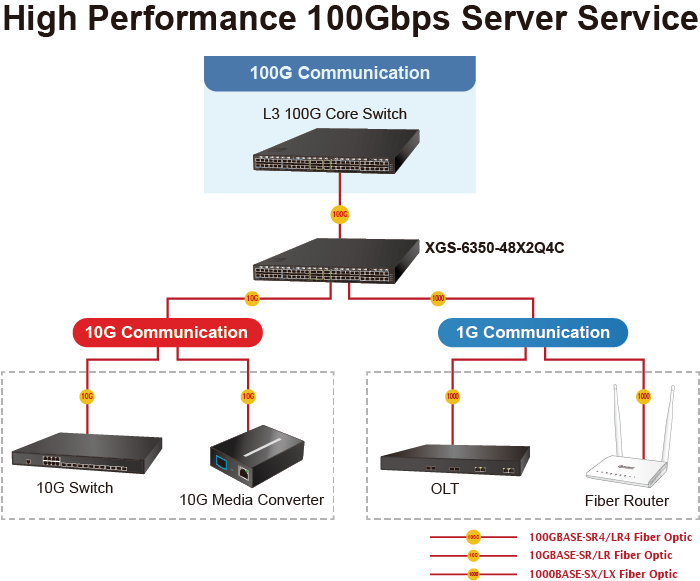
Redundant Ring, Fast Recovery for Critical Network Applications
The XGS-6350-48X2Q4C supports redundant ring technology and features strong, rapid self-recovery capability to prevent interruptions and external intrusions. It incorporates advanced ITU-T G.8032 ERPS (Ethernet Ring Protection Switching) technology and Spanning Tree Protocol (802.1s MSTP) into customer’s network to enhance system reliability and uptime in harsh environments. In a certain simple Ring network, the recovery time could be less than 50ms to quickly bring the network back to normal operation.
High Availability Mesh Networking Solution for Big Data System
By means of improving the technology of Optical Fiber Ethernet with highly-flexible, highly-extendable and easy-to-install features, the XGS-6350-48X2Q4C offers up to 1.92Tbps data exchange speed via Optical Fiber interface and the transmission distance can be extended to 120km (single-mode fiber). The XGS-6350-48X2Q4C features strong rapid self-recovery capability to prevent interruptions and external intrusions. It incorporates Multiple Spanning Tree Protocol (802.1s MSTP) into customer’s automation network to enhance system reliability and uptime. The XGS-6350-48X2Q4C is the ideal solution for data centers, service providers and telecoms to build redundant connection and establish high bandwidth for Big Data server farm.
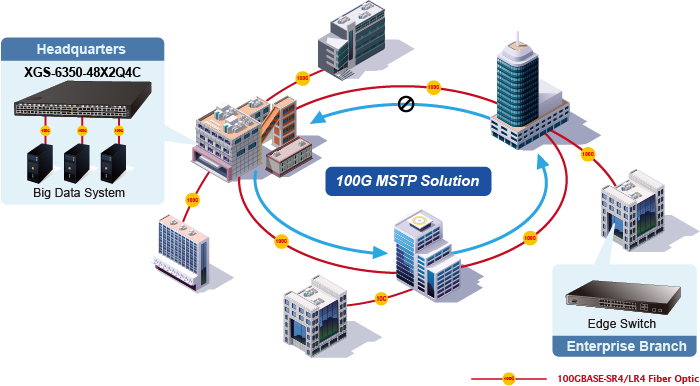
Reliable, High-performance and High-density Enterprise Backbone Switch
40/100 Gigabit Ethernet supported equipment has become the fundamental unit of enterprises and network servers. PLANET XGS-6350-48X2Q4C is the cost-effective, high-density and high-bandwidth chassis switch, which meets today’s market requirements. Its dedicated chassis architecture feature makes all modules in the platform operate together as one much larger switch providing multiple high-performance 40/100-Gigabit Ethernet network for backbone of enterprises, campuses or telecoms.
The redundant management modules and three power supplies provide the XGS-6350-48X2Q4C with nonstop network service ability. Moreover, all modules are hot-swappable. They can be added or exchanged without interrupting the operation of the whole system. The XGS-6350-48X2Q4C is ideal for being a server farm switch connecting to servers and perfectly suitable for those networking environments requiring constant access to critical business applications.
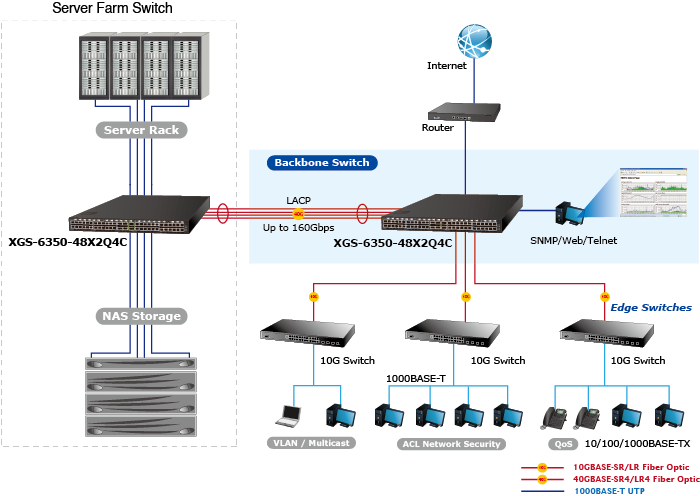
Physical Ports
- 48 10GBASE-SR/LR SFP+ slots, compatible with 1000BASE-SX/LX/BX SFP
- 2 QSFP+ slots with each supporting 40G and 4 x 10 Gigabit Ethernet modes
- 4 QSFP28 slots with each supporting native 100 Gigabit Ethernet, 40G and 4 x 10 Gigabit Ethernet modes
- RJ45 to DB9 console interface for switch basic management and setup
- MNG port for HTTP server access
- USB port
IPv4 Features
- Static Routing, RIP v1/v2, OSPF and BGP
- Policy Routing
- BFD for OSFP and BGP
IPv6 Features
- ICMPv6, DHCPv6, ACLv6,IPv6 Telnet
- IPv6 Neighbor Discovery
- Path MTU Discovery
- MLD and MLD Snooping
- IPv6 Static Routing, RIPng, OSPFv3 and BGP4+
- Manual Tunnel, ISATAP Tunnel and 6-to-4 Tunnel
Multicast Routing Features
- Supports Multicast Routing Protocols:
- PIM-DM (Protocol Independent Multicast - Dense Mode)
- PIM-SM (Protocol Independent Multicast - Sparse Mode)
- PIM-SSM (Protocol Independent Multicast - Source-Specific Multicast Mode)
- Supports IGMP v1/v2/v3
Layer 2 Features
- Supports VLAN
- IEEE 802.1Q tag-based VLAN
- Provider Bridging (VLAN Q-in-Q, IEEE 802.1ad) supported
- GVRP for dynamic VLAN management
- Private VLAN
- Supports Link Aggregation
- 802.3ad Link Aggregation Control Protocol (LACP)
- Cisco ether-channel (static trunk)
- Supports Spanning Tree Protocol
- STP, IEEE 802.1D (Classic Spanning Tree Protocol)
- RSTP, IEEE 802.1w (Rapid Spanning Tree Protocol)
- MSTP, IEEE 802.1s (Multiple Spanning Tree Protocol, spanning tree by VLAN)
- Port mirroring to monitor the incoming or outgoing traffic on a particular port (many to 1)
- Loop protection to avoid broadcast loops
- Link Layer Discovery Protocol (LLDP)
- Ethernet OAM 802.3ah/802.1ag/ITU-Y.1731
- Supports G.8032 ERPS (Ethernet Ring Protection Switching)
Quality of Service
- Ingress shaper and egress rate limit per port bandwidth control
- 8 priority queues on all switch ports
- IEEE 802.1p CoS/DSCP/Precedence
- VLAN ID
- Policy-based ingress and egress QoS
Multicast
- Supports IPv4 IGMP snooping v1, v2 and v3
- Supports IPv6 MLD snooping v1 and v2
- Querier mode support
- MVR (Multicast VLAN Registration)
Security
- Authentication
- IEEE 802.1x port-based network access authentication
- Built-in RADIUS client to cooperate with the RADIUS servers
- RADIUS/TACACS+ users access authentication
- Access Control List
- IP-based Access Control List (ACL)
- MAC-based Access Control List (ACL)
- Time-based ACL
- DHCP Snooping to filter distrusted DHCP messages
- Dynamic ARP Inspection discards ARP packets with invalid MAC address to IP address binding
- IP Source Guard prevents IP spoofing attacks
Management
- IPv4 and IPv6 dual stack management
- Switch Management Interfaces
- Console and Telnet Command Line Interface
- HTTP web switch management
- SNMP v1 and v2c switch management
- SSHv2, SSLv3, TLSv1.0 and SNMP v3 secure access
- SNMP Management
- Four RMON groups (history, statistics, alarms, and events)
- SNMP trap for interface Link Up and Link Down notification
- Built-in Trivial File Transfer Protocol (TFTP) client
- BOOTP and DHCP for IP address assignment
- System Maintenance
- Firmware upload/download via HTTP
- Reset button for system reboot or reset to factory default
- Dual images
- DHCP Functions:
- DHCP Relay
- DHCP Option 82
- DHCP Server
- User Privilege levels control
- Network Time Protocol (NTP), SPAN, RSPAN
- Network Diagnostic
- SFP-DDM (Digital Diagnostic Monitor)
- ICMP remote IP ping
- Syslog remote alarm
- System Log
Stacking Management
- Virtualized multiple XGS-6350-48X2Q4C switches integrated into one logical device
- Single IP address stack management, supporting up to 4 hardware units stacked together
- Stacking architecture supports redundant Ring mode
| Hardware Specifications | |
|---|---|
| QSFP28 Interfaces | 4, each supports native 100/40 Gigabit Ethernet and 4 x 10 Gigabit Ethernet modes |
| QSFP+ Interfaces | 2, each supports 40 Gigabit Ethernet and 4 x 10 Gigabit Ethernet modes |
| SFP+ Interfaces | 48 10GBASE-SR/LR SFP+ interfaces Compatible with 1000BASE-SX/LX/BX SFP transceiver |
| MNG | 1 x 10/100/1000BASE-T RJ45 port |
| Console | 1 x RJ45-to-DB9 serial port (9600, 8, N, 1) |
| USB | 1 x USB 2.0 |
| LED Indicators | System: PWRA, PWRB, Green SYS, Green MNG, Green Ports: 10G SFP+ interfaces: LNK/ACT, Green 40G/100G QSFP28 interfaces: LNK/ACT, Green 40G QSFP+ interfaces: LNK/ACT, Green |
| Dimensions (W x D x H) | 442 x 404 x 44, 1U height |
| Weight | 8.8kg |
| Power Consumption | 147 watts/504.3 BTU (maximum) |
| Power Requirements | AC 100~240V, 50/60Hz DC 36~72V (optional) |
| Fan | 4 |
| Switching Performance | |
| Switch Architecture | Store-and-forward |
| Switch Capacity | 1.92Tbps/non-blocking |
| Switch Throughput | 1440Mpps@64bytes |
| Address Table | 64K MAC address table with auto learning function |
| Shared Data Buffer | 9MB |
| Flow Control | Back pressure for half duplex IEEE 802.3x pause frame for full duplex |
| Jumbo Frame | 9K |
| IPv4 Layer 3 Functions | |
| IP Routing Protocol | RIP v1/v2 OSPFv2 BGP (Border Gateway Protocol) Static routing |
| Routing Features | VRRP Policy routing Load balance through equal-cost routing BFD (Bidirectional Forwarding Detection) for OSPF and BGP |
| IPv6 Layer 3 Functions | |
| IP Routing Protocol | RIPng OSPFv3 BGP4+ |
| Multicast Routing Protocol | PIM-DM and PIM-SM PIM-SSM |
| Routing Features | Manual tunnel ISATAP tunnel 6-to-4 tunnel |
| IPv6 Functions | ICMPv6, DHCPv6, ACLv6, IPv6 Telnet IPv6 Neighbor Discovery Path MTU Discovery |
| Layer 2 Function | |
| Port Configuration | Port disable/enable Auto-negotiation 10/100/1000Mbps full and half duplex mode selection Flow control disable/enable Bandwidth control on each port Port loopback detect |
| VLAN | IEEE 802.1Q tag-based VLAN, IEEE 802.1ad Q-in-Q VLAN stacking/tunneling GVRP for VLAN management Private VLAN Up to 4K VLAN groups |
| Spanning Tree Protocol | IEEE 802.1D Spanning Tree Protocol (STP) IEEE 802.1w Rapid Spanning Tree Protocol (RSTP) IEEE 802.1s Multiple Spanning Tree Protocol (MSTP) BPDU protection, root protection |
| Ring | Supports ITU-T G.8032 ERPS |
| IPv4 IGMP Snooping | IPv4 IGMP v1/v2/v3 snooping IGMP Fast Leave IPv4 Querier mode support IGMP Filtering and IGMP Throttling IGMP Proxy reporting |
| IPv6 MLD Snooping | IPv6 MLD v1/v2 snooping Multicast VLAN Register (MVR) |
| Bandwidth Control | Ingress and Egress At least 64Kbps stream |
| Link Aggregation | IEEE 802.3ad LACP/static trunk Supports 8 groups with 8 ports per trunk group |
| QoS | 8 priority queues on all switch ports Traffic Supervision and Traffic Shaping Scheduling for priority queues - Weighted Round Robin (WRR) - Strict priority (SP) - SP+WRR Traffic classification: - IEEE 802.1p CoS - DSCP - DiffServ - Precedence - TOS - VLAN ID - IP ACL - MAC ACL Policy-based ingress and egress QoS 802.1p and DSCP priority remark |
| Authentication | IEEE 802.1x port-based network access control AAA authentication: TACACS+ and IPv4/IPv6 over RADIUS |
| Security Function | |
| Access Control List | Supports Standard and Expanded ACL IP-based ACL/MAC-based ACL Time-based ACL Up to 1K entries |
| Security | Port isolation Port security, supports IP + MAC + port binding Identification and filtering of L2/L3/L4 based ACL Defend against DOS or TCP attacks Suppression of broadcast, multicast and unknown unicast packet DHCP Snooping, DHCP Option 82 Command line authority control based on user levels |
| AAA | TACACS+ and IPv4/IPv6 over RADIUS |
| Network Access Control | IEEE 802.1x port-based network access control |
| Management Function | |
| System Configuration | Console and Telnet Web browser SNMP v1, v2c |
| Secure Management Interfaces | SSHv2, SSLv3, TLSv1.0 and SNMPv3 Maximum 8 sessions for SSH and Telnet connection |
| System Management | Supports both IPv4 and IPv6 Protocols Supports the user IP security inspection for IPv4/IPv6 SNMP Supports MIB and TRAP Supports TFTP, FTP Supports IPv4/IPv6 NTP Supports RMON 1, 2, 3, 9 groups Supports the RADIUS authentication for IPv4/IPv6 Telnet user name and password The right configuration for users to adopt RADIUS server’s shell management Supports Security IP safety net management function: avoid unlawful landing at non-restrictive area Supports TACACS+ Supports SPAN, RSPAN |
| Event Management | Supports syslog server for IPv4 and IPv6 |
| SNMP MIBs | RFC 1213 MIB-II RFC 1215 Internet Engineering Task Force RFC 1271 RMON RFC 1354 IP-Forwarding MIB RFC 1493 Bridge MIB RFC 1643 Ether-like MIB RFC 1907 SNMPv2 RFC 2011 IP/ICMP MIB RFC 2012 TCP MIB RFC 2013 UDP MIB RFC 2096 IP forward MIB RFC 2233 if MIB RFC 2452 TCP6 MIB RFC 2454 UDP6 MIB RFC 2465 IPv6 MIB RFC 2466 ICMP6 MIB RFC 2573 SNMPv3 notification RFC 2574 SNMPv3 VACM RFC 2674 Bridge MIB Extensions |
| Standard Conformance | |
| Regulatory Compliance | FCC Part 15 Class A, CE |
| Standards Compliance | IEEE 802.3z Gigabit 1000BASE-SX/LX IEEE 802.3ae 10Gb/s Ethernet IEEE 802.3x flow control and back pressure IEEE 802.3ad port trunk with LACP IEEE 802.1D Spanning Tree Protocol IEEE 802.1w Rapid Spanning Tree Protocol IEEE 802.1s Multiple Spanning Tree Protocol IEEE 802.1p Class of Service IEEE 802.1Q VLAN tagging IEEE 802.1X port authentication network control IEEE 802.1ab LLDP RFC 768 UDP RFC 793 TFTP RFC 791 IP RFC 792 ICMP RFC 2068 HTTP RFC 1112 IGMP v1 RFC 2236 IGMP v2 RFC 3376 IGMP v3 RFC 2710 MLD v1 FRC 3810 MLD v2 RFC 2328 OSPF v2 RFC 1058 RIP v1 RFC 2453 RIP v2 ITU-T G.8032 ERPS Ring |
| Environment | |
| Operating | Temperature: 0 ~ 50 degrees C Relative Humidity: 10 ~ 85% (non-condensing) |
| Storage | Temperature: -40 ~ 80 degrees C Relative Humidity: 5 ~ 95% (non-condensing) |
Datasheet
| Date | Version | Description | Download |
|---|---|---|---|
| 2024-01-12 | 1.2 | Release for hardware version 2.0. |
|
Quick Guide
User's Manual

